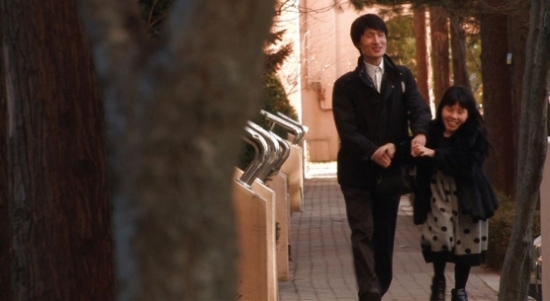
The international winner of this year’s DocAviv film festival was Planet of Snail, a love story from South Korea. Why was this tiny film chosen from among the 182 entries screened at the 14th annual Tel Aviv Documentary Film Festival? Because through what the festival judges called “poetic and pure” cinematography, it portrays the transcendence of love and the sanctity of life in the face of the biggest odds in the world.
The unlikely heroes are a man and wife, both handicapped. The woman is exceedingly tiny, with a crooked spine and a hunchback. But her partner’s disability is one of the most crushing a human being can face: Young-Chan is both profoundly deaf and completely blind.
With utmost delicacy, the film traces the symbiosis of this pair as they navigate through daily life, creating a world resonating with warmth. They communicate through Finger Braille in which fingertips trace words upon the skin of the other. Gatherings with deaf-blind friends portray the extreme isolation and loneliness of this disability. Shut off and at the total mercy of their surroundings, their lives are as slow as a snail’s. Yet, thanks to love and partnership, Young-Chan starts to live a multifaceted life. He attends university where he learns Hebrew and takes examinations via computer; he writes poetry. Led by his wife through the city park, Young-Chan experiences the majesty and beauty of creation: circling a tree with his arms, cheeks pressing the bark, he turns his face upwards to welcome the warmth of the sun. One wishes the couple could see each other’s beautiful faces.
At the end of one showing of Planet of Snail at DocAviv the audience burst into spontaneous applause. I was one of those lucky enough to see that screening, which I chose because director Seung-Jun Yi was present to answer questions. An Israeli film maker asked Seung-Jun Yi - slight, young and modest - how long he would be staying in Israel. Only one more day, Seung-Jun Yi said regretfully. “Why not stay until the jury decides?” the Israeli filmmaker urged. “Your film is so wonderful it might win”. So it did, and it continues to win prizes around the world.
Within Israel there are an estimated 1200 persons who are both deaf and blind. The majority of them suffer from the genetic condition called Ushers Syndrome. Children with Ushers are born deaf. The condition is progressive, so that during their lifetime they gradually lose their eyesight too, until they become blind. Sight loss begins with night blindness, progresses to loss of peripheral vision, then tunnel vision. Finally, around the age of 40, complete blindness.
Deaf-blind persons in Israel are aided by the Ministry of Social Affairs and also by the Center for Deaf-Blind Persons, funded and run by the private foundation Beth David. Located in the Helen Keller House in Tel Aviv, the Center aims to provide help in all areas: social, educational, and rehabilitative. It employs deaf-blind persons, teaches the use of computers to facilitate communication, and offers leisure programs. Terming the cruel interim between the ages of 18 to 40 before complete blindness sets in a “window of opportunity”, the Center targets these years as the time for learning skills to prepare for the moment when the curtain of darkness descends. The Center runs a club in Jerusalem in cooperation with the Jerusalem Municipality for 40 Arab youngsters. It functions as a liaison between deaf-blind and public services as well as advocating for the rights of deaf-blind Israelis. Its existence contributes to mitigating the extreme dependency and isolation of these human beings.
The Center’s social club was visited by Avishai Sheli, the deaf-blind Israeli who in 2002 was co-winner of the 39th International Bible Quiz for Jewish Youth. Sheli went on to earn a college degree and become employed in the stock market. Sheli said that his fellow contestants could store their Bibles in their pockets, whereas the Bible he studied, the Braille version, comprised 25 volumes.
On any day of the year Israelis have the opportunity to experience what the deaf-blind can achieve by visiting the Nalaga’at Center in Jaffa port (See ESRA MAGAZINE, Issue 151 for an in-depth article by Steve Kramer about the Nalaga’at Center). At Nalaga’at, visitors may watch theater performed by a deaf-blind acting ensemble, eat in its café, served by deaf waiters or eat in the dark served by blind waiters at its restaurant.
Still it is hard to comprehend what it means to live forever in a black and silent world.
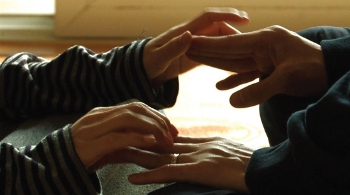
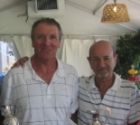 ESRA Golf Competition 2012
ESRA Golf Competition 2012 Upside-Down Coffee – for another world. A Review
Upside-Down Coffee – for another world. A Review If I could tell you - a review
If I could tell you - a review Art from the Heart
Art from the Heart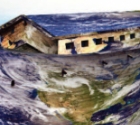 Jewish Art Returns to Jerusalem
Jewish Art Returns to Jerusalem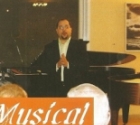 Musical Treats
Musical Treats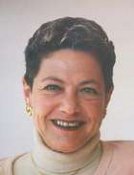 Helen Schary Motro
Helen Schary Motro